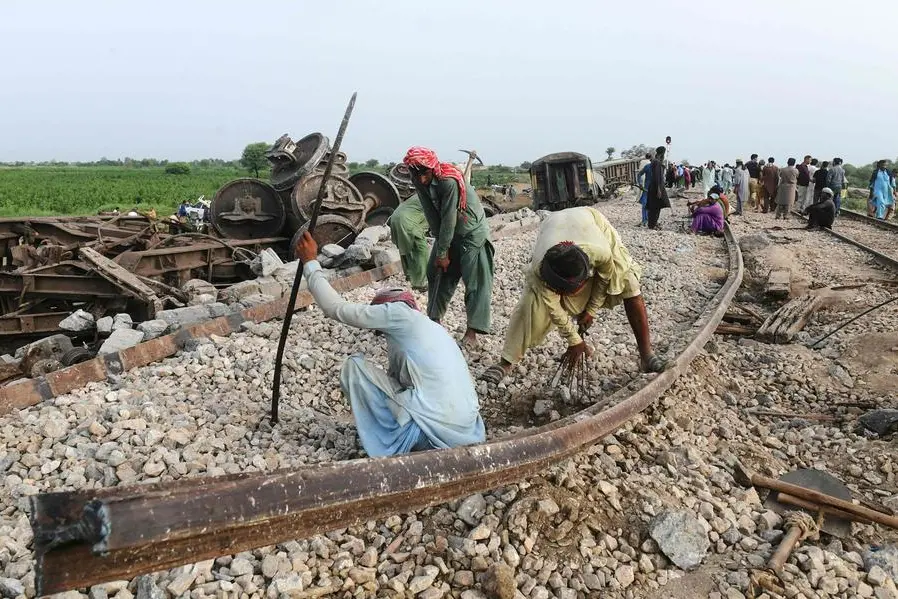PHOTO
Investigators scoured the wreckage on Monday of a weekend train derailment that killed at least 34 people, the latest deadly crash to hit Pakistan's antiquated railway network.
More than 1,000 passengers were aboard the Hazara Express when it came off the tracks in a flat, rural part of Sindh province near Nawabshah, around 250 kilometres (160 miles) by rail from the southern port city of Karachi.
It was winding its way north on a 33-hour journey to Havelian in Khyber Pakhtunkhwa province when disaster struck near Sarhari around lunchtime.
"I was sitting in my shop... Suddenly, there was a huge bang," said Azmat Ali, 25, who has a store near the crash site.
"We immediately thought an accident had taken place. We started running and when we arrived... we pulled out bodies and injured people from the wreckage."
Muhammad Afzal Kolachi, a spokesman for Pakistan Railways, told AFP Monday the death toll had risen to 34.
Hospitals in the area declared an emergency as they struggled to deal with dozens of passengers brought in with severe injuries.
Local residents, some who waded through waist-deep water in a canal that runs alongside the railway track to reach the crash site, were praised for their heroic response.
- Crashes common -
"Despite Sarhari being a backward area, the locals swiftly arrived at the scene to provide assistance," said 28-year-old rescuer Zulfiqar Ali.
"Whoever heard the news -- even women and children -- came here. I saw myself local farmers reached the spot to take part in rescue efforts."
Crashes and derailments occur frequently on Pakistan's antiquated railway system, which has nearly 7,500 kilometres (4,600 miles) of track and carries more than 80 million passengers a year.
The network, once the pride of British rule during the colonial era, still has tracks, junctions and bridges dating back more than 150 years, although modernisation is underway as part of the massive China-Pakistan Economic Corridor.
It is still a favoured means of transport for poor people, especially those who migrate to the mega-city of Karachi for work and then return to their rural homes to visit family.
Railway minister Khawaja Saad Rafique said Sunday that no faults had been reported on the stretch of line where the accident happened, but some residents said it had been affected by the monsoon floods that engulfed a third of the country last summer.
"The track is in a bad condition due to last year's flood," said Ali Dost, a 52-year-old local policeman.
Most of the rail network, however, is lain along berms and the tracks often provided the only high ground for people to take shelter during the floods.
Rafique promised a full investigation.
"There can be two reasons: first that it was a mechanical fault, or the fault was created -- it might be a sabotage. We will investigate it."
A special crane carriage reached the site late Sunday and technicians worked through the night to try and clear the tracks.
"The down track has been cleared and the work is ongoing on the up track," said Shahnawaz Mashori, a 24-year-old teacher who had volunteered at the site.
"We are hopeful that very soon it will be cleared."
Passenger compartments were strewn to the side, mangled steel from the undercarriage twisted and buckled.
Sunday's crash is just the latest to hit the network in recent years.
Two trains collided near Daharki in Sindh in June 2021, killing at least 65 people and injuring about 150 others. In that incident, an express derailed onto the opposite track, and a second passenger train ploughed into the wreckage a minute later.
At least 75 passengers were burnt to death in a fire aboard the Tezgam express train in October 2019, while a two-train collision at Ghotki killed more than 100 people in 2005.
bur-fox/pbt





















